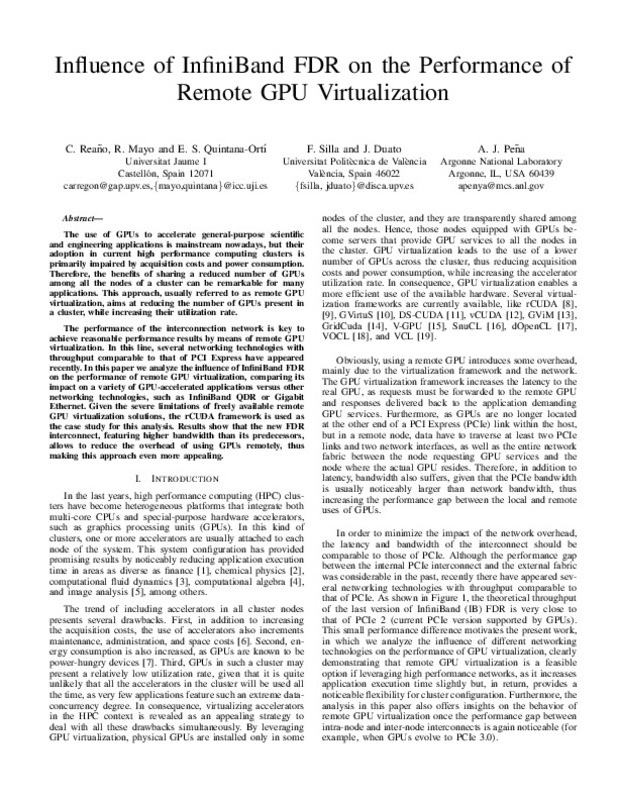Reaño González, C.; Mayo Gual, R.; Quintana Ortí, ES.; Silla Jiménez, F.; Duato Marín, JF.; Peña Monferrer, AJ. (2013). Influence of InfiniBand FDR on the performance of remote GPU virtualization. IEEE. 1-8. https://doi.org/10.1109/CLUSTER.2013.6702662
Por favor, use este identificador para citar o enlazar este ítem: http://hdl.handle.net/10251/67332
|
Título:
|
Influence of InfiniBand FDR on the performance of remote GPU virtualization
|
|
Autor:
|
 Reaño González, Carlos
Mayo Gual, Rafael
Reaño González, Carlos
Mayo Gual, Rafael

 Quintana Ortí, Enrique Salvador
Quintana Ortí, Enrique Salvador

 Silla Jiménez, Federico
Duato Marín, José Francisco
Peña Monferrer, Antonio José
Silla Jiménez, Federico
Duato Marín, José Francisco
Peña Monferrer, Antonio José
|
|
Entidad UPV:
|
Universitat Politècnica de València. Departamento de Sistemas Informáticos y Computación - Departament de Sistemes Informàtics i Computació
Universitat Politècnica de València. Departamento de Informática de Sistemas y Computadores - Departament d'Informàtica de Sistemes i Computadors
|
|
Fecha difusión:
|
|
|
Resumen:
|
The use of GPUs to accelerate general-purpose scientific and engineering applications is mainstream today, but their adoption in current high-performance computing clusters is impaired primarily by acquisition costs and ...[+]
The use of GPUs to accelerate general-purpose scientific and engineering applications is mainstream today, but their adoption in current high-performance computing clusters is impaired primarily by acquisition costs and power consumption. Therefore, the benefits of sharing a reduced number of GPUs among all the nodes of a cluster can be remarkable for many applications. This approach, usually referred to as remote GPU virtualization, aims at reducing the number of GPUs present in a cluster, while increasing their utilization rate. The performance of the interconnection network is key to achieving reasonable performance results by means of remote GPU virtualization. To this end, several networking technologies with throughput comparable to that of PCI Express have appeared recently. In this paper we analyze the influence of InfiniBand FDR on the performance of remote GPU virtualization, comparing its impact on a variety of GPU-accelerated applications with other networking technologies, such as Infini-Band QDR and Gigabit Ethernet. Given the severe limitations of freely available remote GPU virtualization solutions, the rCUDA framework is used as the case study for this analysis. Results show that the new FDR interconnect, featuring higher bandwidth than its predecessors, allows the reduction of the overhead of using GPUs remotely, thus making this approach even more appealing.
[-]
|
|
Palabras clave:
|
Bandwidth
,
Computer architecture
,
Graphics processing units
,
Virtualization
|
|
Derechos de uso:
|
Reserva de todos los derechos
|
|
ISBN:
|
978-1-4799-0896-7
|
|
Fuente:
|
|
|
DOI:
|
10.1109/CLUSTER.2013.6702662
|
|
Editorial:
|
IEEE
|
|
Versión del editor:
|
http://dx.doi.org/10.1109/CLUSTER.2013.6702662
|
|
Título del congreso:
|
2013 IEEE International Conference on Cluster Computing (Cluster 2013)
|
|
Lugar del congreso:
|
Indianapolis, USA
|
|
Fecha congreso:
|
September, 23-27, 2013
|
|
Código del Proyecto:
|
info:eu-repo/grantAgreement/EC/FP7/287759/EU/High Performance and Embedded Architecture and Compilation/
info:eu-repo/grantAgreement/GVA//PROMETEOII%2F2013%2F009/ES/DESARROLLO DE LIBRERIAS PARA GESTIONAR EL ACCESO A DISPOSITIVOS REMOTOS COMPARTIDOS EN SERVIDORES DE ALTAS PRESTACIONES/
info:eu-repo/grantAgreement/DOE//DE-AC02-06CH11357/
|
|
Descripción:
|
2013 IEEE. Personal use of this material is permitted. Permission from IEEE must be obtained for all other uses, in any current or future media, including reprinting/republishing this material for advertising or promotional purposes, creating new collective works, for resale or redistribution to servers or lists, or reuse of any copyrighted component of this work in other works
|
|
Agradecimientos:
|
This work was funded by the Generalitat Valenciana under Grant PROMETEOII/2013/009 of the PROMETEO program phase II. This work was supported in part by the U.S. Department of Energy under contract DE-AC02-06CH11357.
|
|
Tipo:
|
Capítulo de libro
Comunicación en congreso
|







![[Cerrado]](/themes/UPV/images/candado.png)


